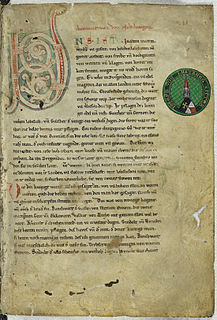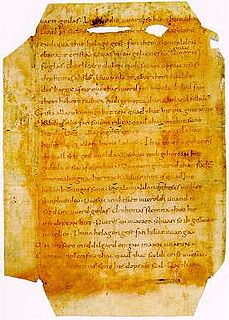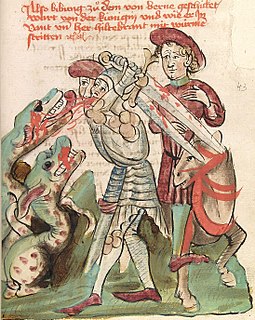Related Research Articles

An epic poem, or simply an epic, is a lengthy narrative poem typically about the extraordinary deeds of extraordinary characters who, in dealings with gods or other superhuman forces, gave shape to the mortal universe for their descendants.
Old English literature refers to poetry and prose written in Old English in early medieval England, from the 7th century to the decades after the Norman Conquest of 1066, a period often termed Anglo-Saxon England. The 7th century work Cædmon's Hymn is often considered as the oldest surviving poem in English, as it appears in an 8th-century copy of Bede's text, the Ecclesiastical History of the English People. Poetry written in the mid 12th century represents some of the latest post-Norman examples of Old English. Adherence to the grammatical rules of Old English is largely inconsistent in 12th-century work, and by the 13th century the grammar and syntax of Old English had almost completely deteriorated, giving way to the much larger Middle English corpus of literature.

The Poetic Edda is the modern name for an untitled collection of Old Norse anonymous narrative poems, which is distinct from the Prose Edda written by Snorri Sturluson. Several versions exist, all primarily of text from the Icelandic medieval manuscript known as the Codex Regius, which contains 31 poems. The Codex Regius is arguably the most important extant source on Norse mythology and Germanic heroic legends. From the early-19th century onwards, it has had a powerful influence on later Scandinavian literatures – not only through its stories, but also through the visionary force and the dramatic quality of many of the poems. It has also become an inspiring model for many later innovations in poetic meter, particularly in Nordic languages, offering many varied examples of terse, stress-based metrical schemes that lack any final rhyme but instead use alliterative devices and strongly-concentrated imagery. Poets who have acknowledged their debt to the Codex Regius include Vilhelm Ekelund, August Strindberg, J. R. R. Tolkien, Ezra Pound, Jorge Luis Borges, and Karin Boye.

The Nibelungenlied, translated as The Song of the Nibelungs, is an epic poem written around 1200 in Middle High German. Its anonymous poet was likely from the region of Passau. The Nibelungenlied is based on an oral tradition of Germanic heroic legend that has some of its origin in historic events and individuals of the 5th and 6th centuries and that spread throughout almost all of Germanic-speaking Europe. Scandinavian parallels to the German poem are found especially in the heroic lays of the Poetic Edda and in the Völsunga saga.
Poetry took numerous forms in medieval Europe, for example, lyric and epic poetry. The troubadours and the minnesänger are known for their lyric poetry about courtly love.
Narrative poetry is a form of poetry that tells a story, often using the voices of both a narrator and characters; the entire story is usually written in metered verse. Narrative poems do not need rhyme. The poems that make up this genre may be short or long, and the story it relates to may be complex. It is normally dramatic, with various characters. Narrative poems include all epic poetry, and the various types of "lay", most ballads, and some idylls, as well as many poems not falling into a distinct type.

The Epic of Manas is a traditional epic poem dating to the 18th century but claimed by Kyrgyz tradition to be much older. Manas is said to be based on Bars Bek who was the first khagan of the Kyrgyz Khaganate. The plot of Manas revolves around a series of events that coincide with the history of the region in the 9th century, primarily the interaction of the Kyrgyz people with Turkic and Chinese people.
Biblical poetry such as the Song of the Sea and the Song of Deborah may be considered early examples of Jewish epic poetry, though very short by normal epic standards. Both songs are compared by scholars to Canaanite and Assyrian epic poetry.

The Heliand is an epic poem in Old Saxon, written in the first half of the 9th century. The title means saviour in Old Saxon, and the poem is a Biblical paraphrase that recounts the life of Jesus in the alliterative verse style of a Germanic epic. Heliand is the largest known work of written Old Saxon.

The Hildebrandslied is a heroic lay written in Old High German alliterative verse. It is the earliest poetic text in German, and it tells of the tragic encounter in battle between a father (Hildebrand) and a son (Hadubrand) who does not recognize him. It is the only surviving example in German of a genre which must have been important in the oral literature of the Germanic tribes.

Waltharius is a Latin epic poem founded on German popular tradition relating the exploits of the Visigothic hero Walter of Aquitaine. While its subject matter is taken from early medieval Germanic legend, the epic stands firmly in the Latin literary tradition in terms of its form and the stylistic devices used. Thus, its 1456 verses are written in dactylic hexameter and the poem includes copious references to various Latin epics of antiquity, especially Vergil's Aeneid.

The Ludwigslied is an Old High German (OHG) poem of 59 rhyming couplets, celebrating the victory of the Frankish army, led by Louis III of France, over Danish (Viking) raiders at the Battle of Saucourt-en-Vimeu on 3 August 881.

Walter or Walther of Aquitaine is a king of the Visigoths in Germanic heroic legend.
Brian Oliver Murdoch is a British philologist who is Emeritus Professor of German at the University of Stirling. He specializes in the study of early Germanic and Celtic literature, on which he has authored and edited several influential works.
Epic is a genre of narrative defined by heroic or legendary adventures presented in a long format. Originating in the form of epic poetry, the genre also now applies to epic theatre, epic films, music, novels, stage play, television series, and video games. Scholars argue that 'the epic' has long since become "disembedded" from its origins in oral poetry.
The GermanicHeroic Age, so called in analogy to the Heroic Age of Greek mythology, is the period of early historic or quasi-historic events reflected in Germanic heroic poetry.

Dietrich von Bern is the name of a character in Germanic heroic legend who originated as a legendary version of the Ostrogothic king Theodoric the Great. The name "Dietrich", meaning "Ruler of the People", is a form of the Germanic name "Theodoric". In the legends, Dietrich is a king ruling from Verona (Bern) who was forced into exile with the Huns under Etzel by his evil uncle Ermenrich. The differences between the known life of Theodoric and the picture of Dietrich in the surviving legends are usually attributed to a long-standing oral tradition that continued into the sixteenth century. Most notably, Theodoric was an invader rather than the rightful king of Italy and was born shortly after the death of Attila and a hundred years after the death of the historical Gothic king Ermanaric. Differences between Dietrich and Theodoric were already noted in the Early Middle Ages and led to a long-standing criticism of the oral tradition as false.
Middle High German literature refers to literature written in German between the middle of the 11th century and the middle of the 14th. In the second half of the 12th century, there was a sudden intensification of activity, leading to a 60-year "golden age" of medieval German literature referred to as the mittelhochdeutsche Blütezeit. This was the period of the blossoming of Minnesang, MHG lyric poetry, initially influenced by the French and Provençal tradition of courtly love song. The same sixty years saw the composition of the most important courtly romances. again drawing on French models such as Chrétien de Troyes, many of them relating Arthurian material. The third literary movement of these years was a new revamping of the heroic tradition, in which the ancient Germanic oral tradition can still be discerned, but tamed and Christianized and adapted for the court.
Old High German literature refers to literature written in Old High German, from the earliest texts in the 8th century to the middle of the 11th century.

Germanic heroic legend is the heroic literary tradition of the Germanic-speaking peoples, most of which originates or is set in the Migration Period. Stories from this time period, to which others were added later, were transmitted orally, traveled widely among the Germanic speaking peoples, and were known in many variants. These legends typically reworked historical events or personages in the manner of oral poetry, forming a heroic age. Heroes in these legends often display a heroic ethos emphasizing honor, glory, and loyalty above other concerns. Like Germanic mythology, heroic legend is a genre of Germanic folklore.
References
- Gloning, Thomas; Young, Christopher (2004). A History of the German Language Through Texts. Abingdon, New York: Routledge. ISBN 0415183316.
- Hatto, A.T. (1980). "Medieval German". In Hatto, A.T. (ed.). Traditions of Heroic and Epic Poetry. Vol. 1: The Traditions. London: Modern Humanities Research Association. pp. 165–195. ISBN 0-900547-72-3 . Retrieved 8 January 2018.
- Heusler, Andreas (1905). Lied und Epos in germanischer Sagendichtung. Dortmund: Ruhfus. Retrieved 9 January 2018.